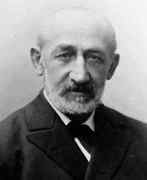Person: Gordan, Paul Albert

Paul Gordan worked with Clebsch on invariant theory and algebraic geometry. He also gave simplified proofs of the transcendence of $e$ and $\pi$.
Mathematical Profile (Excerpt):
- Paul was educated in Breslau where he attended the Gymnasium, going on to study at the business school.
- At this stage Gordan was not heading for an academic career and he worked for several years in banks.
- He had, however, attended lectures by Kummer on number theory at the University of Berlin in 1855 and his interest in mathematics was strongly encouraged by N H Schellbach who acted as a private tutor to Gordan.
- Moving to Königsberg, Gordan studied under Jacobi, then he moved to Berlin where he began to become interested in problems concerning algebraic equations.
- As soon as Gordan had completed his dissertation he went to visit Riemann at Göttingen.
- However, Riemann had caught a heavy cold which turned to tuberculosis so Gordan's visit was cut short.
- In 1863 Clebsch invited Gordan to come to Giessen.
- The first work which Gordan and Clebsch worked on in Giessen was the theory of abelian functions.
- The Clebsch-Gordan coefficients used in spherical harmonics were introduced by them as a result of this cooperation.
- The topic for which Gordan is most famous is invariant theory and Clebsch introduced him to this topic in 1868.
- For the rest of his career, although Gordan did not work exclusively on this topic, it would be fair to say that invariant theory dominated his mathematical research.
- For the next twenty years Gordan tried to prove the finite basis theorem conjecture for nnn-ary forms.
- Gordan did not undertake the bulk of this work at Giessen, however, for he moved to Erlangen in 1874 to become professor of mathematics at the university.
- When Gordan was appointed Klein held the chair of mathematics at Erlangen but he moved in the following year to the Technische Hochschule at Munich.
- In the year 1874-75 when Gordan and Klein were together at Erlangen they undertook a joint research project examining groups of substitutions of algebraic equations.
- Hilbert submitted his results to Mathematische Annalen and, since Gordan was the leading world expert on invariant theory, he was asked his opinion of the work.
- Gordan found Hilbert's revolutionary approach difficult to appreciate and not at all consistent with his ideas of constructive mathematics.
- Gordan was recognised as the leading world expert on invariant theory and he was also a close friend of Klein's.
- Gordan also worked on algebraic geometry and he gave simplified proofs of the transcendence of e and π.
- This was rather an unfortunate episode since it resulted in Gordan, who had enjoyed a fine reputation, losing respect from his colleagues.
Born 27 April 1837, Breslau, Prussia (now Wrocław, Poland). Died 21 December 1912, Erlangen, Germany.
View full biography at MacTutor
Tags relevant for this person:
Algebra, Origin Poland
Thank you to the contributors under CC BY-SA 4.0! 

- Github:
-

- non-Github:
- @J-J-O'Connor
- @E-F-Robertson
References
Adapted from other CC BY-SA 4.0 Sources:
- O’Connor, John J; Robertson, Edmund F: MacTutor History of Mathematics Archive
